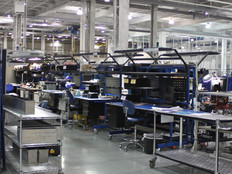Cellular Routers Offer a Tantalizing Prospect: Wireless Anywhere
Cellular routers bring reliable broadband connectivity to users and devices in locations where the wired connections that enable Wi-Fi service are either unavailable or highly degraded. “Cellular routers are increasingly important,” says Jeff Kagan, an independent wireless industry analyst. “They connect to smartphones, computers and all sorts of devices to let users share information and communicate from anywhere.”
For businesses with offices or branches located in a remote community that may lack high-speed wired broadband network access, cellular routers may be the only way of providing reliable broadband connectivity, other than turning to comparatively slow and expensive satellite links. “Cellular routers have become a powerful tool for businesses that need to supply connectivity to devices in places where it is either physically impossible or it doesn't make financial sense to provide the wired connection that enables Wi-Fi,” says Jacob Sharony, principal consultant at Mobius Consulting, a mobile and wireless technology management consulting firm.
This technology also excels as a network backup resource, capable of providing automatic failover/failback service in the event of a wired network or Wi-Fi failure. “Having such a capability is important for many different kinds of businesses, ranging from retailers to financial institutions, none of whom can afford to have their Internet connectivity interrupted for any period of time,” Sharony says.
“Small to midsized branch offices without multiple wired wide-area network [WAN] redundancy options will tend to rely on cellular more often than larger branch locations in cases of primary broadband or multiprotocol label switching disruption, due to comparatively lower overall bandwidth requirements,” says Dave Chen, a product marketing manager for Aruba Networks. “Larger branch locations that house vast amounts of corporate resources tend to have multiple WAN redundancy options with dual broadband or dual MPLS circuits, and have a less pressing need for cellular failover.”
Giving Businesses Added Flexibility
Thanks to their speed, portability and flexibility, cellular routers can be used in numerous ways. Retailers operating “pop-up” holiday-oriented outlets such as Halloween shops, Christmas tree lots and fireworks stands, for example, can take advantage of cellular routers to handle credit card processing, inventory management and other routine business tasks, even when far away from a wired connection. Trade show exhibitors, food truck vendors, sporting event sponsors and outdoor concert organizations can also take advantage of the technology to obtain fast and reliable connectivity.
“If you're going to be setting up temporarily, whether for a day or several months, you need a solution that is easy to set up and take down without the delays or costs of installing wires,” says Bryan O’Flaherty Wills, director of product management for enterprise solutions with Sierra Wireless.
These solutions can also supply connectivity to businesses operating in historic buildings, shopping malls and stadiums or arenas where there are no existing wired lines or where the network infrastructure's owner refuses to offer network access at a reasonable cost. “You can create your own Internet access where a wired or Wi-Fi connection isn't available,” says Mike Fratto, a principal enterprise networking and data center technology analyst for Current Analysis. “For locations without wire drops or Wi-Fi, a cellular router offers an easy, all-in-one solution for access.”
Connecting Devices and Monitoring Assets
Many organizations also face the challenge of bringing continuous connectivity to their mobile assets (such as trucks, buses, trains and public safety vehicles), enabling tracking, monitoring, and other communication services. “Cellular routers are the obvious solution for vehicles moving around a city or on long-distance routes traveling from city to city,” Sharony says.
Cellular routers are also often used to monitor and manage fixed assets, providing constant and reliable connections to geographically dispersed vending machines, information kiosks, digital signage, ticket dispensers and ATMs. “Bringing wired connections to such devices can often be very impractical or expensive and, in some cases, not even possible,” Sharony says.
Industrial and scientific applications for this technology include monitoring and controlling terrestrial and airborne vehicles over long distances, as well and managing and monitoring various types of remote equipment, providing reliable and failsafe links even in dynamic and radio-hostile environments. “You see cellular routers, for example, in energy applications — oil and gas — connecting pipelines and monitoring what's going on,” Wills says.
As the sensor revolution gains momentum, leading to a profusion of devices designed to monitor people, places and things in ways that could scarcely be imagined just a few years ago, cellular routers will perform the critical task of relaying data from the field to data centers. “This is an emerging area which is expected to grow considerably as the Internet of Things becomes increasingly wirelessly enabled,” says Paul Anuszkiewicz, vice president of spectrum planning for CTIA-The Wireless Association, a Washington-based wireless industry trade organization.
Cellular technology's benefits for sensor operators are obvious, Fratto says. “With Wi-Fi, you're really limited, on a good day, to maybe 100 meters,” he says. “When you're using cellular, the sensors can be almost anywhere, and they will get coverage.” Cellular routers can also be configured to conserve energy at remote sites. “The sensors are not sending back a whole lot of data, so they might collect data for an hour, literally phone home, transfer their data, and then turn off again,” Fratto says.
Ensuring Data Security Is Critical
Like other wireless communications devices, cellular routers require security protections to safeguard network resources against intruders, attackers and various types of malware. Security is particularly important for retail deployments, which must comply with the Payment Card Industry Data Security Standard, a set of requirements designed to ensure that all companies that process, store or transmit credit card data maintain a secure environment.
Chen says that for all types of cellular router deployments, security is most effectively enforced with encryption applied directly to the traffic traveling across the network. Context awareness, which enforces granular security policies based on user, device, application, location and other attributes, is another powerful security tool. “In this way, a malicious attempt made at the local branch router or controller, or along some point before reaching the data center, fails because, for instance, the wrong user or device was used in the wrong location,” Chen says. “This also has benefits as far as user experience, since quality of service can be applied based on context and improves performance for corporate apps versus personal apps.”
Anuszkiewicz notes that firewalls and password-protected virtual private network tunnels can also be used to strengthen cellular data network security.
Wireless Networks Do Have Limitations
When planning a cellular router deployment, IT managers should remember that while current 4G LTE data rates are impressive in terms of cellular network performance, the technology still lags well behind the speed of most wired and Wi-Fi networks. Although cellular networks can support most routine business tasks with ease, performance will begin to fall off rapidly as multiple users jam onto a single connection, particularly if they begin running bandwidth-demanding applications.
Although data consumption levels aren't usually a major consideration for businesses using wired or Wi-Fi networks, cellular data network use rates require close attention since many cellular carriers impose limits on data usage and often charge steeply for overages. “Different carriers will come with different price tags for data, especially as new cellular bandwidth capabilities are introduced,” Chen says. In other words, it pays to shop around before committing to a carrier.
And while cellular data service is generally reliable, problems do sometimes occur, particularly in fringe areas where weak signal strength may result in significantly degraded data speeds. “In terms of reliability, the quality of connection is a major concern for customers, many of whom require high-quality service-level agreements in place to ensure always-on connections,” Chen says.
Achieving and maintaining robust and efficient network management is another important issue facing cellular router adopters. “If you deploy a couple of cellular routers in your business, you can probably manage them quite easily, but if you deploy 500 of them, you have a unique challenge on your hands,” Wills says. “For example, how's the coverage I'm getting from AT&T on this site versus Verizon on that site? How am I doing in terms of auditing the configuration of these devices, or providing a software update that provides a security patch?” Answering such questions with the help of a management tool, Wills notes, is essential to operating a reliable and cost-effective cellular router-enabled network.
While wired and Wi-Fi networks are supported by an extensive array of powerful management tools, cellular router users have traditionally faced far fewer choices. “The challenge is that many vendors offer a variety of management options depending on different customer use cases,” Chen says. Organizations that didn't fit a particular use case, or had unique needs, were often left in the dust. Fortunately, cellular router network management is rapidly changing for the better.
Aruba Networks, for example, now offers a comprehensive routing management solution consisting of the Intelligent Management Center (IMC) and the Branch Intelligent Management System (BIMS) module to simplify deployment and management. Sierra Wireless and some other cellular router makers offer a different approach. “Devices like ours, that offer programmability and a programming interface, will allow businesses to write custom applications,” Wills says.
Looking Ahead
Chen anticipates a bright future for cellular data applications. “The focus on cellular routing is mainly centered on remote branch or micro-user scenarios,” he says. “However, as industry technologies evolve, we will see additional use cases.”
Kagan agrees. “As technology continues to advance, we look for faster and better technology to stay in touch and share and distribute information,” he says. “That's some of the reasons why cellular routers are increasingly important going forward.”
To learn more about CDW’s wireless networking solutions and services, visit CDW.com/wifi.








